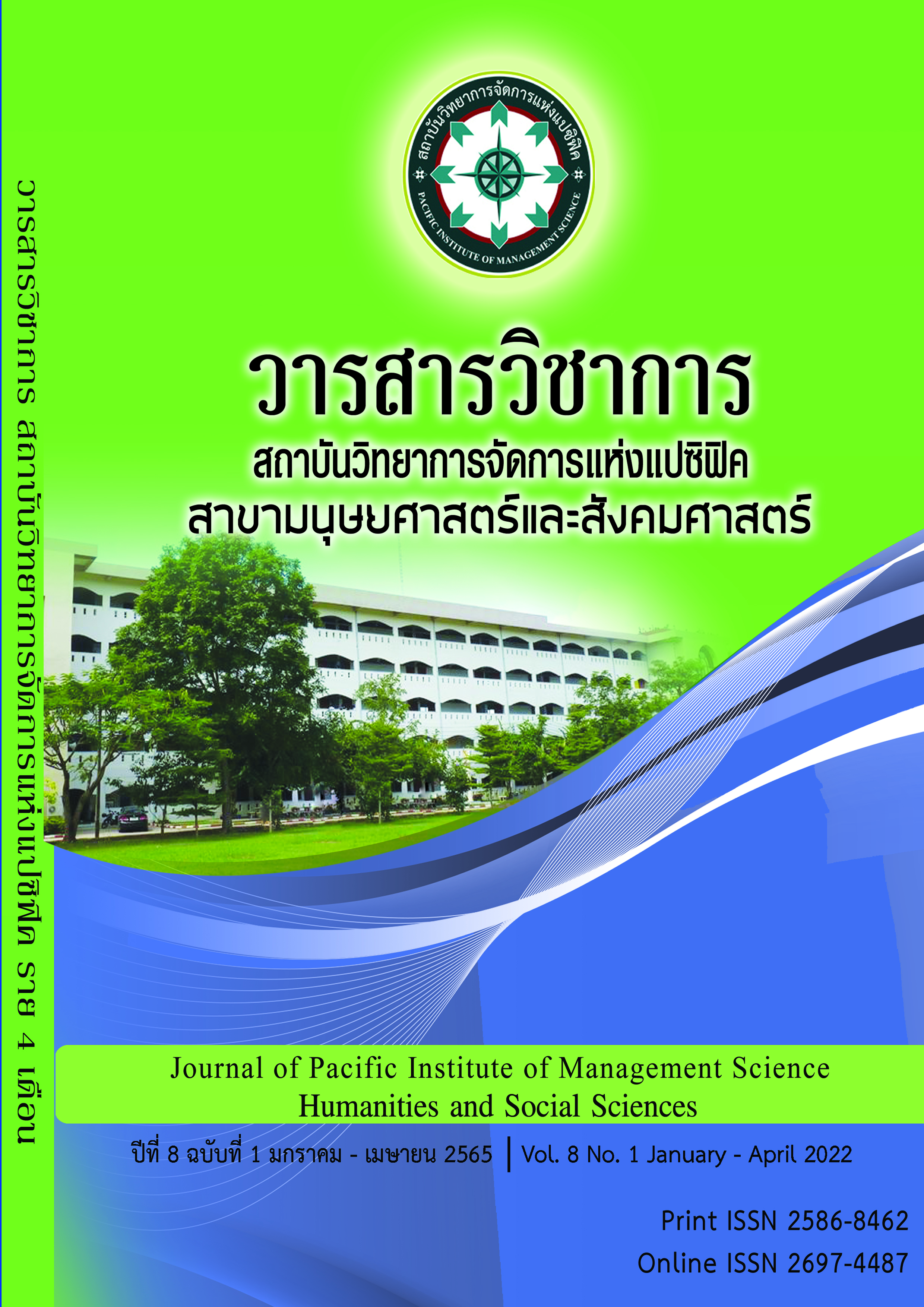The Casual Factor Model of Professionalism at Works and Organizational Effectiveness of Dangerous Goods Transport Companies
Keywords:
Professionalism, Organization Effectiveness, Dangerous Goods Transport Companies, Cross-border Transport from Thailand to Lao P.D.R.Abstract
The objectives of this dissertation are (1) to study factors influencing the Professionalism at Works and the Organizational Effectiveness of dangerous goods transport companies, (2) to develop a casual factor Model of Professionalism at Works and Organizational Effectiveness of dangerous goods transport companies, and (3) to verify the consistency of the casual factor Model of Professionalism at Works and Organizational Effectiveness of dangerous goods transport companies which was developed with empirical data. This dissertation was conducted by using Mixed Methods Research including Qualitative Research and Quantitative Research. For the Qualitative Research, the In-dept Interview was conducted with the top management and the assigned personnel of the selected companies transporting dangerous goods between Thailand and Lao P.D.R and registered as international transport enterprises with Department of Land Transport in Thailand with the total number of 10 persons. For the Quantitative Research, the Purposive Sampling was used to conduct the research where the samplings are selected from the top management and the assigned personnel of the selected companies transporting dangerous goods between Thailand and Lao P.D.R and registered as international transport enterprises with Department of Land Transport in Thailand with the total number of 300 persons out of 30 selected companies. There are in total 5 latent variables in this research including Staff Competency at Work, Commitment to Work, Technology Acceptance Model, Professionalism at Work and Organizational Effectiveness. The data collection was collected by Questionnaires between August and December 2020 and collected data was analyzed by Structural Equation Modeling (SEM) and Focus Group Interview was used to confirm the findings of this Model.
The research findings suggest that the Staff Competency at Work has direct and positive influence on Professionalism at Work as well as direct and positive influence on Organizational Effectiveness. In addition, the Commitment to Work has direct and positive influence on Professionalism at Work as well as direct and positive influence on Organizational Effectiveness. Furthermore, the Technology Acceptance Model has direct and positive influence on Professionalism at Work as well as direct and positive influence on Organizational Effectiveness. Ultimately, it confirms that these findings are consistent with the determined research hypothesis.
References
พีรญา ชื่นวงศ์. (2560). ประสิทธิภาพในการปฏิบัติงานของพนักงาน : กรณีศึกษา ธุรกิจการขนส่งในจังหวัดเชียงราย. วารสารเศรษฐศาสตร์และกลยุทธ์การจัดการ. คณะเศรษฐศาสตร์ ศรีราชา มหาวิทยาลัย เกษตรศาสตร์ ปีที่ 4 ฉบับที่ 2 (กรกฎาคม – ธันวาคม 2560), 92 – 100.
ลัดดาวัลย์ เพชรโรจน์และอัจฉรา ชำนิประศาสน์. 2547. ระเบียบวิธีการวิจัย. กรุงเทพฯ: พิมพ์ดีการพิมพ์.
วิชิต อู่อ้น. (2550). การวิจัยและการสืบค้นข้อมูลทางธุรกิจ. กรุงเทพฯ: เซ็นทรัลเอ็กซ์เพรส.
สำนักงานสภาพัฒนาการเศรษฐกิจและสังคมแห่งชาติ. (2563). แผนพัฒนาเศรษฐกิจและสังคมแห่งชาติฉบับที่ 12 พ.ศ. 2560-2564. กรุงเทพฯ: สำนักงานสภาพัฒนาการเศรษฐกิจและสังคมแห่งชาติ.
สำนักงานปลัดกระทรวงคมนาคม. (2557). โครงการร่างกฎหมายการขนส่งสินค้าอันตรายสำหรับทุกภาคการขนส่งของประเทศ. กรุงเทพฯ: สำนักงานฯ 2557.
Chang, R. (2001). Turning passion into organizational performance. Training and Development, 55(5), 104 -112.
Chen, L. C., Lai, Y. C., Yeh, Y. H., Lin, J. W., Lai, C. N., & Weng, H. C. (2013). Enhanced mechanisms for navigation and tracking services in smart phones 2013. Journal of Applied Research and Technology, 11, 272 – 282
Dubois, David D. and Rothwell William J. (2004). Competency-Based Human Resource Management Palo Alto, CA: Davies-Black Publishing.
David C. McClelland. (1973). The Achieving Society. Princeton, NJ: Van Nostrand
Davis, F.D. (1989). Perceived usefulness, perceived ease of use, and user acceptance of information technology. MIS Quarterly, 13(3), 319–340
G. Nowacki, C. Krysiuk and R. Kopczewski. (2016). Dangerous Goods Transport Problems in the European Union and Poland. The International Journal on Marine Navigation and Safety of Sea Transportation, volume 10, page 147.
McAllister, S. 2006. Competency based assessment of speech pathology student’ performance in the workplace. Retrieved May 5, 2020, from http://ses.library.usyd.edu.au/handle.
Pellegrino,E.D. (2002). Professionalism, Profession and the Virtues of the good Physician. Mount Sinai journal of medicine, 69(6), 378-384
Steers, R.M. (1977). Organizational effectiveness: A behavioral view. Santa Monica, CA: Goodyear.
Venkatesh, V., Morris, M.G., Davis, G.B., & Davis, F.D (2003). User Acceptance of Information Technology: Toward a Unified View. MIS Quarterly, 27(3), 425-478
Yanhonga, F., & Xiaofab, S. (2013). Research on freight truck operation characteristics based on GPS data. Procedia Social and Behavioral Sciences, 96, 2320 – 2331.
Zammuto, R.F. 1982. Assessing Organizational Effectiveness, System Change, Adaptation and Strategy. Albany: state University of New York Press.
Downloads
Published
Issue
Section
License
Copyright (c) 2022 Pacific Institute of Management Science

This work is licensed under a Creative Commons Attribution-NonCommercial-NoDerivatives 4.0 International License.
บทความที่ได้รับการตีพิมพ์เป็นลิขสิทธิ์ของ สถาบันวิทยาการจัดการแห่งแปซิฟิค
ข้อความที่ปรากฏในบทความแต่ละเรื่องในวารสารวิชาการเล่มนี้เป็นความคิดเห็นส่วนตัวของผู้เขียนแต่ละท่านไม่เกี่ยวข้องกับสถาบันวิทยาการจัดการแห่งแปซิฟิค และคณาจารย์ท่านอื่นๆในสถาบันฯ แต่อย่างใด ความรับผิดชอบองค์ประกอบทั้งหมดของบทความแต่ละเรื่องเป็นของผู้เขียนแต่ละท่าน หากมีความผิดพลาดใดๆ ผู้เขียนแต่ละท่านจะรับผิดชอบบทความของตนเองแต่ผู้เดียว







